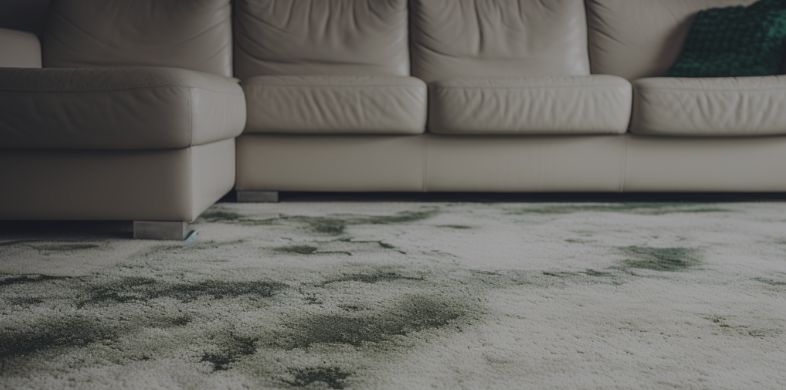Maintaining a clean and healthy home is a top priority for many homeowners and businesses. One common issue that can disrupt this is the presence of mold in carpets. Understanding the safest way to remove mold from carpet is crucial to ensure the health and safety of everyone in the environment. Mold not only damages carpets but can also pose significant health risks.
Let’s explore the most effective methods to tackle this problem.

Understanding Mold Growth in Carpets
Mold thrives in damp, dark environments. Carpets, especially those in basements or areas prone to moisture, are ideal breeding grounds. Mold spores can settle and grow quickly, leading to potential health issues such as allergies, respiratory problems, and more.
Why Mold Forms in Carpets
Mold in carpets can form due to various reasons, such as spills, leaks, or high humidity levels. Understanding the cause is the first step in prevention. For more information on how to manage humidity to prevent mold, visit humidity levels.
Preparing for Mold Removal
Before tackling the mold, its essential to prepare properly. This includes gathering necessary materials and ensuring personal safety.
Gathering Necessary Materials
You will need protective gear such as gloves and masks, cleaning agents like vinegar or baking soda, and equipment like brushes and a vacuum with a HEPA filter.
Ensuring Personal Safety
Wearing protective gear is crucial when handling mold. This prevents inhalation of spores and protects your skin from irritants.
Step-by-Step Mold Removal Process
Once prepared, follow these steps to safely and effectively remove mold from your carpet.
Step 1: Identify the Affected Areas
Inspect the carpet thoroughly to locate all moldy spots. Mark these areas for treatment.
Step 2: Vacuum the Carpet
Use a vacuum with a HEPA filter to remove loose spores. This step helps to contain the mold and prevents further spreading.
Step 3: Apply Cleaning Solutions
Prepare a cleaning solution using either vinegar or baking soda. These natural cleaners are effective against mold. Apply the solution to the affected areas and scrub gently with a brush.
Step 4: Rinse and Dry the Carpet
After scrubbing, rinse the area with clean water and blot it dry with towels. Ensure the carpet is completely dry to prevent mold from returning. For more tips on keeping your carpet dry, visit dry carpet cleaning.
Preventing Future Mold Growth
Prevention is better than cure. Implementing measures to prevent mold can save time and effort in the future.
Maintain Low Humidity Levels
Keep humidity levels below 60% to prevent mold growth. Use dehumidifiers if necessary.
Regular Carpet Cleaning
Regularly clean and vacuum your carpets to prevent mold spores from settling in. Learn more about dealing with mold after leaks at mold after leaks.
When to Seek Professional Help
If the mold problem is extensive or persistent, it might be time to seek professional help. Professionals have the tools and expertise to handle severe cases effectively.
Signs You Need a Professional
Consider professional assistance if the mold covers a large area, if you experience health issues, or if DIY methods have failed.
Choosing a Mold Removal Service
Choose a service with good reviews, proper certifications, and experience in dealing with carpet mold.
Conclusion
Understanding the safest way to remove mold from carpet is essential for maintaining a healthy indoor environment. By following the steps outlined and taking preventive measures, you can protect your home or business from the dangers of mold.

FAQs
What natural methods can I use to remove mold?
Natural methods like using vinegar or baking soda are effective for removing mold. They are safe and non-toxic.
Can mold in carpets cause health problems?
Yes, mold can cause respiratory issues, allergies, and other health problems.
How often should I clean my carpets to prevent mold?
Regular cleaning, at least once every few months, helps prevent mold growth. Frequent vacuuming is also beneficial.
For more comprehensive tips on preventing carpet mold, check out Preventing Carpet Mold.
This article contains affiliate links. We may earn a commission at no extra cost to you.


